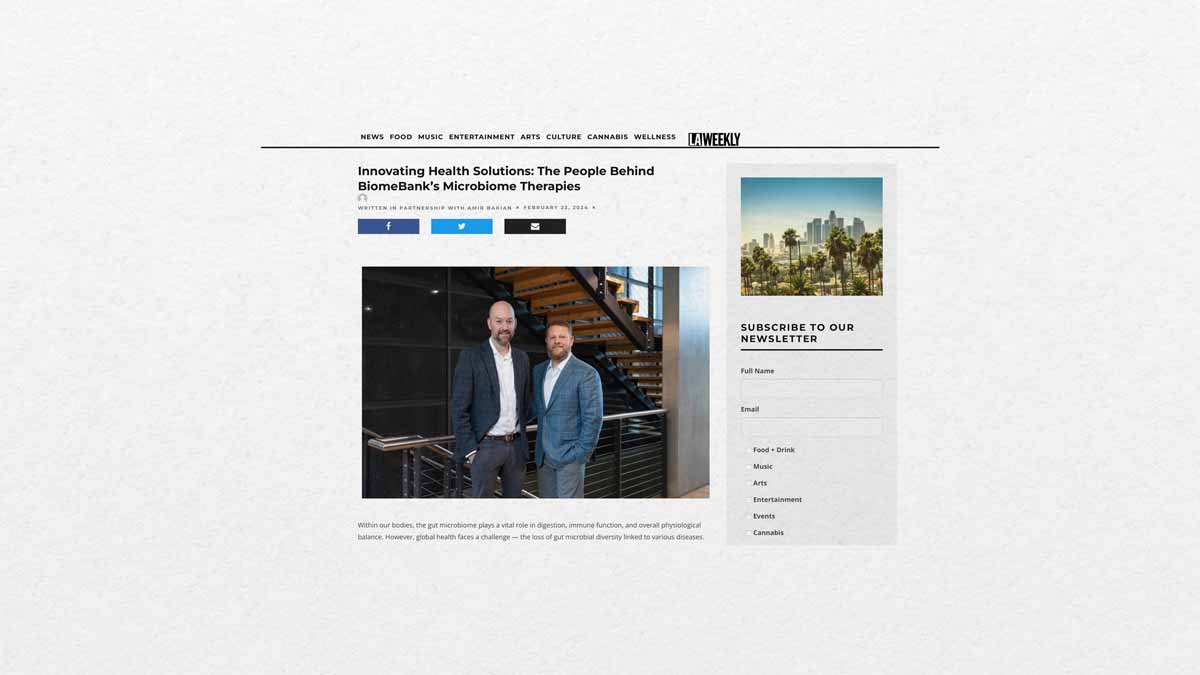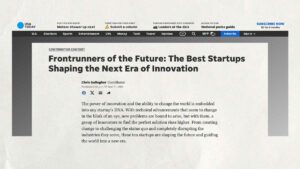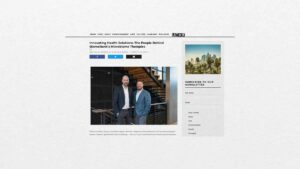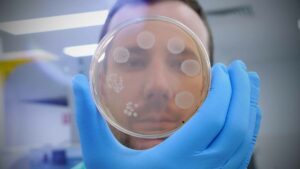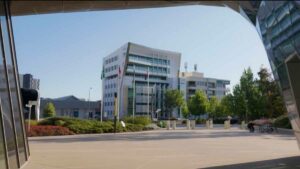The original article was published by LA Weekly here.
Written by Amir Bakian | February 2024
Within our bodies, the gut microbiome plays a vital role in digestion, immune function, and overall physiological balance. However, global health faces a challenge — the loss of gut microbial diversity linked to various diseases.
BiomeBank has developed a solution to this problem. The CONSORTIOME TM is a cultured human gut microbiota that contains many of the most common species in the human bowel and can be cultured independently of human donors. It contains the majority of the known gene families in a healthy human gut microbiome and, therefore, can broadly restore lost microbial function while also targeting diseases with specific microbes to treat disease.
BiomeBank has used studies of the world’s first approved microbiome therapy BIOMICTRA (FMT), to identify organisms and mechanisms of action associated with therapeutic benefit and have enriched the CONSORTIOME™ community for these specific functions.
The company’s founders, Dr. Sam Costello, Assoc. Prof. Rob Bryant, Dr. Emily Tucker, and Dr. Sam Forster envision a future where microbiome-based therapies treat many common diseases caused by the loss of gut microbes.
Leveraging the groundbreaking work of co-founder and Chief Scientific Officer Dr. Sam Forster, who enabled the growth of previously “unculturable” human gut microbes, BiomeBank has amassed an extensive bank with over 35,000 bacteria and 900 species. This collection of human gut microbes has served as a foundation for developing therapies designed to treat ulcerative colitis, and Crohn’s disease, among others.
With a focus on microbiome research, CEO Dr. Sam Costello‘s background includes training in gastroenterology at The Queen Elizabeth Hospital (Australia) and St Mark’s Hospital (UK). His journey includes a seminal randomized controlled trial of fecal microbiota transplantation (FMT) for ulcerative colitis, a pivotal project awarded as the best clinical trial at the European Crohn’s and Colitis meeting.
In addition to clinical expertise, Dr. Costello earned a Ph.D. at the University of Adelaide, diving deep into microbiome therapies. A recognized leader in microbiome drug development, Dr. Costello co-founded BiomeBank in 2018. Under his leadership, the company achieved the first approval for a microbiome therapy worldwide.
Assoc. Prof. Rob Bryant brings a wealth of clinical expertise to BiomeBank, particularly in Inflammatory Bowel Disease (IBD). An internationally recognized expert, Bryant has conducted over 90 peer-reviewed publications and played a pivotal role in clinical trials exploring microbial manipulation in IBD. His contributions extend beyond the clinic, as evidenced by his current position as Chair of the Gastroenterology Society of Australia IBD Executive Committee. Bryant’s work in microbial manipulation positions BiomeBank at the forefront of IBD research.
Dr. Emily Tucker, an infectious diseases specialist, brings a unique perspective to BiomeBank, specializing in gut microbiome, clinical infectious diseases, and epidemiology. Armed with a Master of Public Health and Tropical Medicine, Dr. Tucker’s regulatory insight played a crucial role in leading the writing of the dossier for BIOMICTRA, the first microbiome therapy approved worldwide. As a co-founder, she established and oversees BiomeBank’s donor screening program, contributing to the company’s commitment to ensuring the safety and efficacy of their therapies.
In addition to the founders, Kolby Day, Chief Operations Officer, has played a critical role in BiomeBank’s success. His background and expertise in commercial strategy, regulatory, and manufacturing experience bring critical technical expertise to the company. With experience spanning over 20 years in cell therapy, orthopedics, and wound care, Kolby has navigated the complexities of bringing cell therapies to the US market.
Prior to co-founding BiomeBank, Dr. Costello established a stool bank in an academic laboratory from which he started to deliver an early version of the product to treat C. difficile infection—a severe condition resulting from antibiotic use. He could see a much larger clinical need, and BiomeBank was founded with two aims. The first was to bring a donor-derived microbiome therapy to the Australian market, and the second was to use this therapy to develop cultured microbiome therapy for a worldwide market.
While developing the first donor-derived microbiome therapy in the world, BIOMICTRA, to treat C. difficile infection, the company recognized that donor-derived therapies have limitations. The pivotal realization was that the true potential lay in cultured therapies that offer advantages in composition control, scalability, and targeted disease treatment.
“There’s a huge unmet medical need for patients with ulcerative colitis, and I could see that with the ability to culture organisms from the microbiome, we could create an artificial version of the donor product that had a number of advantages,” says Dr. Costello
With almost one in 200 people affected by ulcerative colitis, the urgency for more effective and less invasive therapies becomes paramount. Current treatments often fall short in achieving high rates of remission, exposing patients to the risks of serious side effects such as infections and cancer. Beyond Ulcerative Colitis, there are a large number of common diseases, such as obesity, metabolic, and immune-related diseases associated with a loss of human gut microbes. BiomeBank is working with partners to leverage their microbiome therapeutic platform to develop therapies that can address the urgent need for new treatments, ensuring a safer and more sustainable approach to disease management.
BiomeBank’s future outlook is shaped by a steadfast commitment to delivering microbiome therapies that redefine the therapeutic landscape. The company’s collaborative endeavors, technological prowess, and fusion of science and commercial expertise position them as leaders in the field of live bacterial therapeutics.
BiomeBank has developed a solution to this problem. The CONSORTIOME TM is a cultured human gut microbiota that contains many of the most common species in the human bowel and can be cultured independently of human donors. It contains the majority of the known gene families in a healthy human gut microbiome and, therefore, can broadly restore lost microbial function while also targeting diseases with specific microbes to treat disease.
BiomeBank has used studies of the world’s first approved microbiome therapy BIOMICTRA (FMT), to identify organisms and mechanisms of action associated with therapeutic benefit and have enriched the CONSORTIOME™ community for these specific functions.
The company’s founders, Dr. Sam Costello, Assoc. Prof. Rob Bryant, Dr. Emily Tucker, and Dr. Sam Forster envision a future where microbiome-based therapies treat many common diseases caused by the loss of gut microbes.
Leveraging the groundbreaking work of co-founder and Chief Scientific Officer Dr. Sam Forster, who enabled the growth of previously “unculturable” human gut microbes, BiomeBank has amassed an extensive bank with over 35,000 bacteria and 900 species. This collection of human gut microbes has served as a foundation for developing therapies designed to treat ulcerative colitis, and Crohn’s disease, among others.
With a focus on microbiome research, CEO Dr. Sam Costello‘s background includes training in gastroenterology at The Queen Elizabeth Hospital (Australia) and St Mark’s Hospital (UK). His journey includes a seminal randomized controlled trial of fecal microbiota transplantation (FMT) for ulcerative colitis, a pivotal project awarded as the best clinical trial at the European Crohn’s and Colitis meeting.
In addition to clinical expertise, Dr. Costello earned a Ph.D. at the University of Adelaide, diving deep into microbiome therapies. A recognized leader in microbiome drug development, Dr. Costello co-founded BiomeBank in 2018. Under his leadership, the company achieved the first approval for a microbiome therapy worldwide.
Assoc. Prof. Rob Bryant brings a wealth of clinical expertise to BiomeBank, particularly in Inflammatory Bowel Disease (IBD). An internationally recognized expert, Bryant has conducted over 90 peer-reviewed publications and played a pivotal role in clinical trials exploring microbial manipulation in IBD. His contributions extend beyond the clinic, as evidenced by his current position as Chair of the Gastroenterology Society of Australia IBD Executive Committee. Bryant’s work in microbial manipulation positions BiomeBank at the forefront of IBD research.
Dr. Emily Tucker, an infectious diseases specialist, brings a unique perspective to BiomeBank, specializing in gut microbiome, clinical infectious diseases, and epidemiology. Armed with a Master of Public Health and Tropical Medicine, Dr. Tucker’s regulatory insight played a crucial role in leading the writing of the dossier for BIOMICTRA, the first microbiome therapy approved worldwide. As a co-founder, she established and oversees BiomeBank’s donor screening program, contributing to the company’s commitment to ensuring the safety and efficacy of their therapies.
In addition to the founders, Kolby Day, Chief Operations Officer, has played a critical role in BiomeBank’s success. His background and expertise in commercial strategy, regulatory, and manufacturing experience bring critical technical expertise to the company. With experience spanning over 20 years in cell therapy, orthopedics, and wound care, Kolby has navigated the complexities of bringing cell therapies to the US market.
Prior to co-founding BiomeBank, Dr. Costello established a stool bank in an academic laboratory from which he started to deliver an early version of the product to treat C. difficile infection—a severe condition resulting from antibiotic use. He could see a much larger clinical need, and BiomeBank was founded with two aims. The first was to bring a donor-derived microbiome therapy to the Australian market, and the second was to use this therapy to develop cultured microbiome therapy for a worldwide market.
While developing the first donor-derived microbiome therapy in the world, BIOMICTRA, to treat C. difficile infection, the company recognized that donor-derived therapies have limitations. The pivotal realization was that the true potential lay in cultured therapies that offer advantages in composition control, scalability, and targeted disease treatment.
“There’s a huge unmet medical need for patients with ulcerative colitis, and I could see that with the ability to culture organisms from the microbiome, we could create an artificial version of the donor product that had a number of advantages,” says Dr. Costello
With almost one in 200 people affected by ulcerative colitis, the urgency for more effective and less invasive therapies becomes paramount. Current treatments often fall short in achieving high rates of remission, exposing patients to the risks of serious side effects such as infections and cancer. Beyond Ulcerative Colitis, there are a large number of common diseases, such as obesity, metabolic, and immune-related diseases associated with a loss of human gut microbes. BiomeBank is working with partners to leverage their microbiome therapeutic platform to develop therapies that can address the urgent need for new treatments, ensuring a safer and more sustainable approach to disease management.
BiomeBank’s future outlook is shaped by a steadfast commitment to delivering microbiome therapies that redefine the therapeutic landscape. The company’s collaborative endeavors, technological prowess, and fusion of science and commercial expertise position them as leaders in the field of live bacterial therapeutics.

